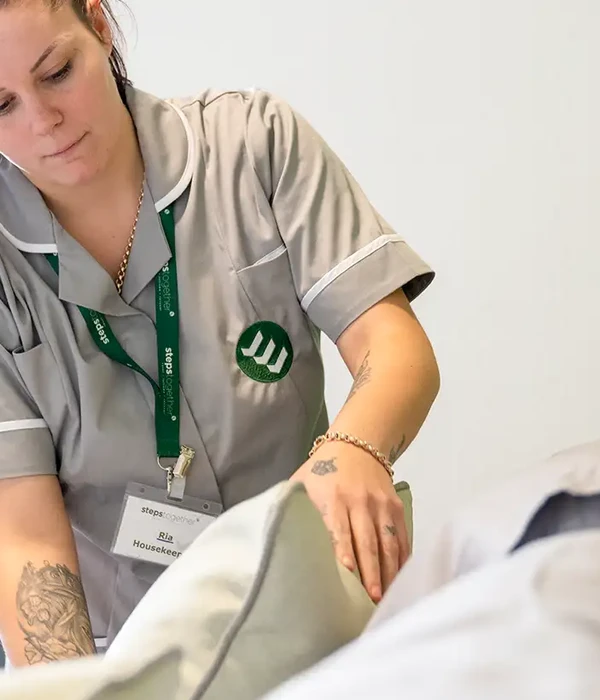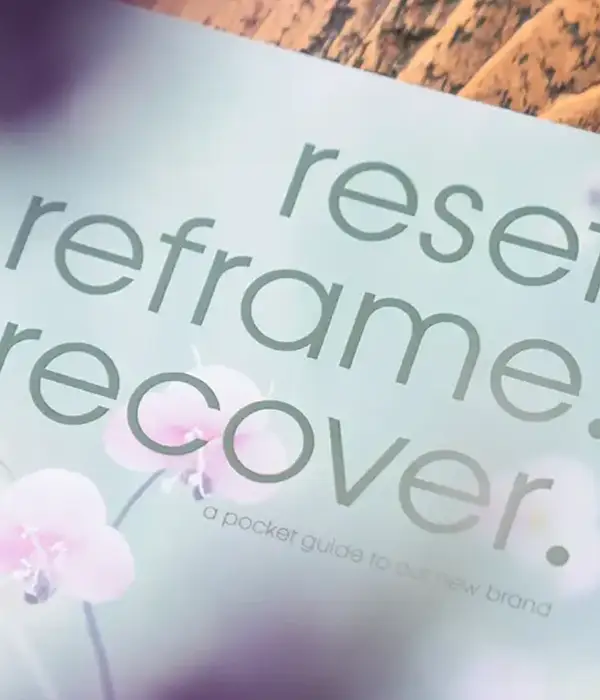Morphine Addiction Treatment
Morphine is a medication used for pain, but it can also be highly addictive due to euphoric effects that users may experience. Effective morphine addiction treatment offers a path to regain control, and many will need morphine rehab to overcome opioid use.
You have options for help, whether you want to quit on your own or need medical support. Treatment options often include safe detox, medicine, and therapy to address both the body’s need for morphine and the reasons for addiction.

Take the First Step Towards Recovery
Steps Together offers personalised support and proven treatments, providing the care, guidance and encouragement you need to move forward with confidence and build a healthier future.

Understanding Morphine Addiction
Morphine is a powerful opioid medicine made from the opium poppy plant. Doctors prescribe morphine, often as morphine sulphate, to treat moderate to severe pain that less powerful painkillers cannot manage. It is commonly used in cases like cancer pain, injury, or after major surgery.
Morphine works by binding to opioid receptors in your brain and spinal cord, blocking pain signals, and producing a sense of calm or euphoria. While opioids are often prescribed for pain relief, their medical benefit also brings significant risks. Once you start morphine use, your body and brain can quickly adapt to its effects, which may lead to dependence or addiction.
How Addiction Develops
Morphine abuse does not happen immediately; it is usually a gradual process. At first, you may need the medicine to manage pain, but over time, your body develops a dependence, or you may need to take morphine to function properly.
This can lead you to take more than prescribed or use it in ways not intended by your doctor. Addiction occurs when you have a strong urge or craving to keep using morphine, even if it causes harm to you or your life.


Risk Factors and Causes
Certain factors make you more likely to develop addiction from the use of morphine. If you have a family history of addiction, you may have a genetic predisposition. People who struggle with mental health problems such as depression or anxiety are also at higher risk.
If you have chronic pain and you’re using morphine for long periods, you’re also at risk, especially when dosages increase over time. Peer pressure and easy access to opioids can also increase the likelihood that you will misuse morphine. Other factors include traumatic events, stressful environments, having a history of substance misuse, and mental health disorders.
Effective Morphine Addiction Treatments
A morphine rehab programme usually includes medical intervention, psychological therapies, and support services. Treatment plans can be adjusted based on medical needs, mental health concerns, and the level of support you require.
Medication-Assisted Treatment (MAT)
Medication-assisted treatment (MAT) is a key part of comprehensive care. Medications such as methadone, buprenorphine, and naltrexone help manage withdrawal, reduce cravings, and prevent relapse. These medicines act on the same brain receptors as morphine but in safer and controlled ways.
Methadone is given daily under supervision. It helps stabilise you and prevents the highs and lows that can trigger drug abuse. Buprenorphine can be prescribed for use at home after an initial period of supervision. It blocks withdrawal and also curbs cravings. Naltrexone is different because it blocks the effects of opioids if you use them again.
Inpatient Rehabilitation Programmes
Inpatient rehab means you stay at a residential treatment centre. Here, you receive round-the-clock medical supervision in a safe and structured environment. This approach is helpful for severe opioid addiction, when there is a risk of serious withdrawal symptoms or relapse.
During an inpatient treatment programme, you receive medical detoxification, supervision, therapy, and support to develop healthy habits. Staff often include doctors, nurses, and therapists who are trained to help people with substance use disorder.
Therapies
Therapies such as cognitive behavioural therapy (CBT) are crucial for tackling the psychological side of morphine addiction. CBT helps you learn how to spot triggers, manage cravings, and develop coping skills. This can help you avoid situations or feelings that lead to substance abuse.
You may also participate in group therapy, where you share experiences and learn from others who face similar challenges. Family therapy can address issues at home that contribute to morphine misuse.
Outpatient Programmes
Outpatient programmes let you live at home while attending treatment sessions during the week. This allows you to keep up with work, school, or family while you get help for opioid addiction. Outpatient programmes may vary in length and intensity depending on the level of support you require.
You may attend group meetings, one-on-one therapy, and medication check-ins at a nearby clinic or community centre. These services include relapse prevention, education about drug abuse, and support for co-occurring mental health issues.
Other drug addiction treatment services we offer

Long-Term Morphine Rehab
Staying free from morphine addiction is a continuous process. Long-term recovery requires consistent support, healthy living habits, and regular check-ins to prevent setbacks and promote a stable, drug-free life.
After you finish initial treatment for morphine addiction, a strong aftercare plan helps you keep making progress. Aftercare can include regular check-ins with a therapist, doctor, or case manager. These visits help track your recovery and provide early help if cravings or stress return.
Support and Self-Help Groups
Connecting with support groups like Narcotics Anonymous (NA) gives you regular encouragement and understanding from people similarly struggling with morphine addiction. Meetings typically involve sharing experiences, learning from one another, and utilising a 12-step programme to guide recovery. These groups are available nationwide and are free to attend.
A big part of staying sober is learning to spot your triggers and making a plan to avoid them. Triggers can include stress, seeing old friends who use drugs, or certain places. Writing these down and practising ways to deal with them helps you prepare for tough moments. Combining morphine addiction treatment with mindfulness, relaxation exercises, and hobbies can reduce stress and fill your time with positive activities instead of cravings.

Recognising Signs and Symptoms
Morphine affects your body in several direct ways. You may notice increased drowsiness or feel tired much of the day. Many people experience nausea or vomiting, especially if they have used morphine for a while. Constipation is a common side effect that can become severe.
Morphine addiction changes more than your body; it can also affect your behaviour and mental health. You may notice sudden mood swings or become irritable for no reason. Some people isolate themselves from family and friends. Your day may start to revolve around finding or using morphine.
A morphine overdose is a medical emergency and requires immediate help. Signs often include shallow or very slow breathing, bluish lips or fingertips, and severe drowsiness where you cannot be woken. The central nervous system is strongly depressed, which means you may lose consciousness or fall into a coma.
The Detoxification Process
Detoxification from morphine involves managing withdrawal symptoms, following medical protocols, and coping with cravings that could lead to relapse. Medical oversight and support are key parts of making the process safer and more effective.
Morphine Withdrawal Symptoms
Withdrawal can begin within hours of beginning morphine detox. You might feel anxious, restless, or irritable. The physical symptoms often include muscle aches, sweating, a runny nose, watery eyes, and yawning.
As withdrawal peaks, the effects of morphine withdrawal may become more severe. These could include nausea, vomiting, diarrhoea, and abdominal cramps. Some people also experience chills and trouble sleeping.
Managing Cravings and Relapse Risks
Cravings during detox can be strong and are a major risk for relapse. Managing these cravings starts with professional support and often includes medication, therapy, and support groups.
Cognitive behavioural therapy can help you change your response to cravings and develop healthier habits. Support from counsellors or group meetings, such as Narcotics Anonymous, provides accountability and motivation.
Medical Detoxification Procedures
A medically supervised detox is recommended for those seeking help for morphine because withdrawal symptoms can be intense or risky. In a medical setting, you receive continuous monitoring and support, which helps keep you safe during the detox process.
Medical professionals may use medicines such as buprenorphine or methadone to reduce withdrawal severity and cravings. They might also prescribe non-opioid medicines to help manage symptoms like nausea, diarrhoea, or anxiety. Your vital signs are checked regularly to spot any health issues early.

Seek Treatment for Morphine Addiction
Opioids like morphine can have medical benefits. For those who struggle with pain, morphine can be essential for finding relief. But, like many drugs, morphine is not without its risks, and there are consequences to using morphine, even with medical supervision.
Morphine addiction can develop relatively quickly, and it can be debilitating. In some cases, it can be fatal. But at Steps Together, we offer morphine addiction treatment so you can retake your life from morphine.
Frequently Asked Questions
What are the most effective therapies for overcoming opioid dependence?
Behavioural therapies, such as cognitive behavioural therapy, help you understand triggers and change your response to them. These interventions can also help you set goals, learn coping strategies, and build a new daily routine.
Can long-term recovery from opioid addiction be effectively maintained, and if so, how?
Long-term recovery is possible with ongoing therapy, medical support, and a strong relapse prevention plan. Regular check-ins with healthcare professionals and adjustments to your treatment plan help identify and manage setbacks early.
Are there any risks associated with the use of substitution medications in the treatment of opioid dependency?
Substitution medications like methadone and buprenorphine can be very helpful, but there are some risks. If not managed by a doctor, you could become dependent on the substitute medication. Side effects are possible, and misuse can lead to further health problems.
How does medically assisted detoxification aid in managing withdrawal symptoms?
Medically assisted detox involves doctors monitoring your health as you stop using morphine. You may receive medications that lower the risk of severe symptoms, making the process safer and more comfortable. Your medical team can address problems quickly, offer reassurance, and adjust treatments as needed.
What role do support groups play in the rehabilitation process for opioid addiction?
Support groups provide a platform for you to connect with others who face similar challenges. They offer emotional encouragement, practical advice, and a sense of community. Sharing experiences and hearing from others at different stages of recovery can boost confidence and motivation.
What strategies are recommended for dealing with cravings and preventing relapse in opioid recovery?
Strategies for managing cravings include using coping techniques learned in therapy, such as distraction, mindfulness, and stress reduction. Avoiding triggers and high-risk situations is important. Regularly attending therapy sessions and support groups helps keep you accountable and motivated.





